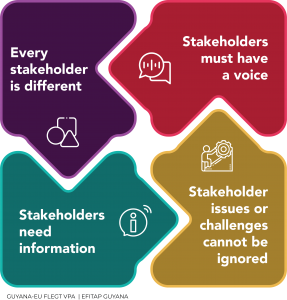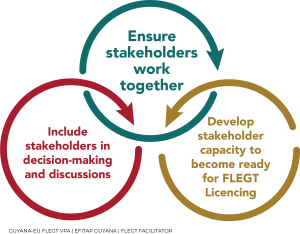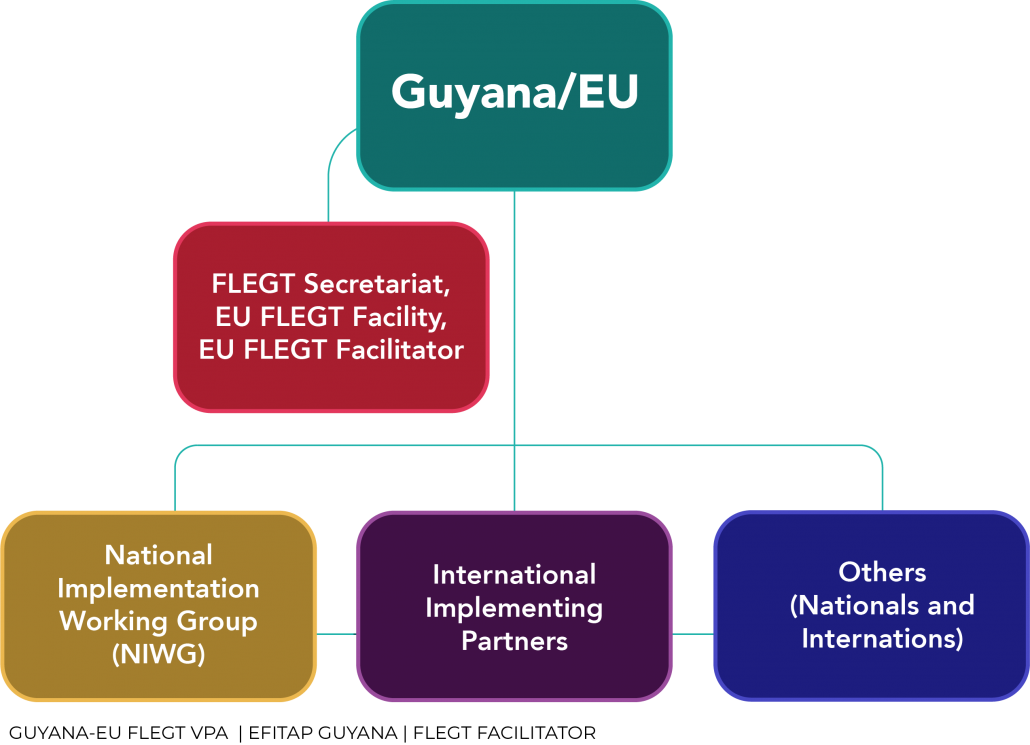FLEGT VPA
The Voluntary Partnership Agreement (VPA) defines stakeholders as the people, companies and institutions that affect or are affected by a process or activity. It encourages cooperation among stakeholder groups to bridge differences and encourage broad support. The VPA recognizes that each group has unique priorities, capacities and perspectives regarding the legality of timber products.
The policy decision to commence negotiations on the FLEGT VPA was taken after a series of consultations with key internal and external stakeholders in Guyana. These stakeholder consultations comprised of representatives from every administrative region of Guyana and included concessionaires, saw millers, civil society, Community Forestry Organizations, International NGOs and representatives from Indigenous communities.
Stakeholders have provided insights into and analysis of the forestry sector in Guyana, offering a valuable basis for the JIF planning process and the Legality Definition.
VPA Stakeholder Management
Stakeholder Approach
The VPA requires the use of a Multi-Stakeholder Coordination Approach which uses a participative method that is transparent, enables coordination and involves diverse actors.
The Joint Implementation Framework (JIF) was prepared under the National Technical Working Group (NTWG) using this approach.
The Legality Definition (LD), a core element of the Guyana Timber Legality Assurance System (GTLAS) that defines legal timber, was also developed through the multi-stakeholder participative process coordinated by the NTWG. A vast majority of key stakeholders within Guyana’s forestry sector and other interest groups were represented. Stakeholders included loggers, sawmillers, manufacturers, timber dealers, timber exporters, timber importers, transporters, customs brokers, logging associations, Amerindian villages and communities, NGOs including indigenous organizations, Government ministries and agencies.
In 2018, the NIWG replaced the NTWG but the approach continues to be utilized with the support of the FLEGT Facilitator.
Multi-stakeholder Approach
Stakeholder Structure
List of Stakeholders
Key Stakeholders
Those who can significantly influence or are important to the success of the VPA implementation in Guyana.
Parties to the VPA
- Government of Guyana
- Guyana Forestry Commission (GFC)
- Ministry of Natural Resources (MNR)
- Guyana Parliament (for ratification of the VPA)
- European Union (Brussels and Delegation of the EU in Guyana)
Local Implementation Bodies and Committees
- FLEGT Secretariat
- Pre-Joint Monitoring and Review Committee (JMRC) and JMRC
- Government Coordination Body (GCB)
- National Implementation Working Group (NIWG)
Regulatory Agencies and Support
GTLAS Agencies
- Guyana Forestry Commission (GFC)
- Guyana Revenue Authority (GRA)
- Ministry of Amerindian Affairs
- Ministry of Labour
- National Insurance Board (NIB)
- Guyana Lands and Surveys Commission (GLSC)
- Guyana Geology and Mines Commission (GGMC)
- Environmental Protection Agency (EPA)
- Deeds and Commercial Registries Authority (DCRA)
- Friendly Societies Registry
- Department of Co-operative Societies
- Land Registry (LR)
- National Plant Protection Organization (NPPO)
- Guyana Wildlife Conservation and Management Commission
- Ministry of Public Works (MoPW)
- Office of the President (OP)
Legal Reform
Financing
Support
- EU FLEGT Facility
- European Forest Institute Technical Assistance Project (EFITAP)
- Food and Agriculture Organization (FAO)-EU FLEGT Programme
- FPA-FAO Project
- FLEGT Facilitator
- World Resources Institute (WRI)
- French Development Agency (AFD)
Capacity-building/Market and Trade Support
Primary Stakeholders
Individuals and groups who are ultimately affected by the VPA implementation in Guyana.
- Forest Sector Operators (FSOs) with legal status and the legal right to harvest timber in large and small state forest concessions (concessionaires: Timber Sales Agreements (TSAs), Wood Cutting Licensees (WCLs) and individual State Forest Permission (SFPs) and Community Forest Associations)
- FSOs with valid mining leases and/ or permits
- FSOs with valid agricultural leases
- Private forest owners with approval to convert their forests to non-forest land uses
- Amerindian villages and Amerindian land title holders
- FSOs with approval and licenses to operate mobile and static sawmills (sawmillers)
- FSOs operating facilities for value adding and/or further processing of timber and timber products (timber processing facilities)
- FSOs approved to trade in timber and timber products in the domestic market including Lumberyard operators and agents
- Exporters of timber and timber products
- Importers of timber and timber products
- Forest-based communities
- Forest Products Association (FPA)
- Guyana Manufacturing and Services Association (GMSA)
- National Toshaos’ Council (NTC)
- Indigenous NGOs
- Indigenous Peoples’ Commission
- Forest sector workers (chainsaw operators, skidder operators, labourers, etc.)
- Transportation providers
Secondary Stakeholders
Individuals or institutions not involved in or impacted directly or indirectly by the VPA Implementation but who have an interest in the overall management of the forests and sustainable livelihoods of communities.
Academic/training institutions
- University of Guyana (UoG)
- Guyana School of Agriculture (GSA)
- Guyana Mining School and Training Centre incorporated (GMSTCI)
- Ministry of Education (MoE)
Environmental NGOs
- Iwokrama International Centre
- World Wildlife Fund (WWF)
- Conservation International, Guyana
- Transparency International, Guyana
International Development Organizations/Investment Community
- World Bank Group
- Inter-American Development Bank (IADB)
- UN agencies local offices
- The Guyana Office for Investment (GO-Invest)
- Banks and investment community
- Embassies in Guyana
- Oil sector – Exxon, others




